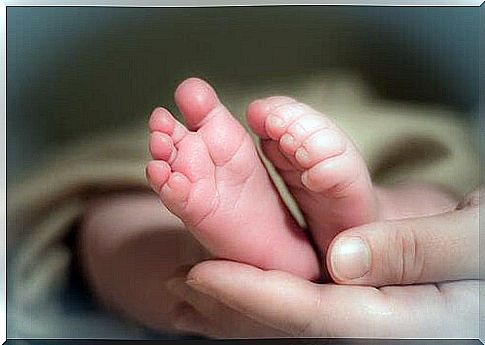Perinatal Grief: It Affects Many Women
When a baby dies after the 22nd pregnancy, or even a week after birth, it is known as perinatal death. The grief that followed is great

Perinatal distress often occurs after the baby dies, before or a few days after birth. This is an intense pain that often surprises the woman, her partner and the family.
The pregnant woman got used to the idea that the baby is already on its way and is looking forward to the day she would become a mother. However, for various reasons, the baby can die, which shakes everyone.
Perinatal distress affects the woman, her partner, and their families. As with any loss of a loved one, it leaves deep emotional marks. And what makes the whole thing worse is the fact that the parents and other relatives never really got to know the baby.
When pregnancy becomes part of a sad statistic

The news of a longed-for pregnancy means a true explosion of happiness. The feelings, desires and expectations spill over. Nonetheless , it’s important to get through the first quarter to make sure the pregnancy is safe.
Spontaneous losses often happen before the 12th or 13th week of pregnancy. While this creates an emotional burden for the woman, it is not referred to as perinatal distress .
Silent perinatal grief

In addition to the intense pain that comes with losing the child one has so longed for, there is the fact that perinatal grief is not recognized in the parents’ social and professional environment.
This makes the process of acceptance and healing even more complex and slower.
Several factors can add to the emotional distress a woman experiences when she loses her baby:
- Previous spontaneous departures or perinatal deaths that were not dealt with.
- The time the couple spent having a baby.
- The age of the woman, as the pressure increases over time.
- The loss of a multiple pregnancy.
- The feeling of connectedness brought about by pregnancy, especially when the woman has seen the baby come into the world.
- Lack of social support. Health insurance companies and hospitals do not always provide adequate care for these cases.
- The absence of the father when he has not confessed to the child.
- The fact that the woman cannot share experiences and memories with family or friends, and cannot name or say goodbye to the baby.
The stages of perinatal distress
Perinatal distress can last for days, weeks, months, or even years. It all depends on the woman’s mind and the conditions surrounding the baby’s death.
As with all types of grief, there are different stages or stages.
The denial phase
At a time when it is difficult to believe that perinatal death has occurred. The woman was mentally unprepared to receive such shocking news.
Through this state of shock and disbelief, the mind gradually digests the stressful reality.
The phase of anger

At this stage the mother feels guilty for what happened. She is angry at herself, at her partner, and at the doctors who have had contact with her baby.
If the woman is a believer, she may even be mad at God for not understanding why all of this happened. Often those affected also feel envy of other couples for whom the pregnancy proceeds without complications.
The negotiation phase
This stage begins when guilt turns into confusion. Reflecting on “If I had done this or that” preoccupies the parents who have suffered the loss.
They keep wondering what would have happened if they had done this or that differently and whether they could have prevented their child’s death. They also imagine how nice it would have been with the baby.
The stage of depression

The negotiation phase only lasts for a short time and then turns into depression. Given the incontrovertible reality of perinatal death, emotions or feelings such as sadness, aversion, insomnia, or loss of appetite arise.
In addition, there may be fears as to whether a new pregnancy will be possible or the fear that the same thing will happen again with the next pregnancy.
The phase of acceptance
The final stage of perinatal grief. At this stage, the woman accepts that life goes on even after she has suffered a terrible loss.
Everyday life is slowly returning. Of course, it will take some time before she can regain hope of becoming pregnant.
Getting over the perinatal heartache
If you’ve just lost your baby, you have every right to perinatal heartache. This is important in accepting the loss, crying, and healing the wound.
To help you deal with the different stages of perinatal distress, here are some pieces of advice we can offer you:
- First, your doctor should explain to you exactly the medical reasons that led to your loss. Also what consequences this can have for future pregnancies.
- In addition, you shouldn’t avoid mentioning your baby to your partner, family, friends, or work colleagues. To deal with grief, you don’t have to forget your lost baby.
- Cry from the bottom of your heart and do not set yourself a deadline to overcome the loss.
- You should also do whatever it takes to feel a little better every day.
- Don’t forget to take care of your physical and emotional health. If you need professional help, don’t hesitate to get it.
- Nobody can put pressure on you about what to do with the clothes or other baby items that you have already bought.
- Laughing is healthy. Do not be afraid or think that you do not appreciate the memory of your baby just because you are laughing or enjoying yourself.
- If you want to perform a ritual to say goodbye to the baby or to honor his memory, do so.

Final thoughts
Perinatal heartache must be lived regardless of the reasons that led to the loss of the baby. The wife, partner and family have the right to live and to overcome pain. Step by step, normality will return. It’s just a matter of patience and waiting.









